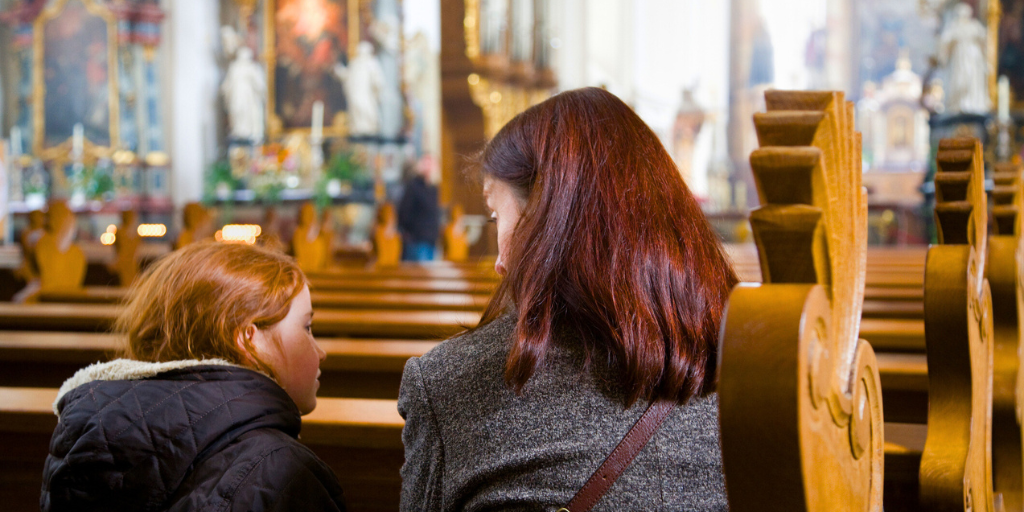
Katie Flodder considers how Jesus’ poignant question to Peter is also a deeper invitation for all of us.
Whenever I take a moment to push pause on the chaos of life and look at my life with intentionality, I’m able to see that God is loving me all the time. And yet, if asked, would He say the same about me? Would there be a knee-jerk response like, “Of course!”? Or would there be a long pause before He generously offers, “Well, there was that one time she gave up the chance to watch the Vanderpump Rules reunion for prayer time.”
The Rock himself faced this difficult question as Jesus asked Peter not once but three times, “Do you love Me?” We know that Peter isn’t lacking for enthusiasm when it comes to our Lord, so it’s interesting that He poses that question three times in a row. There’s no condemnation in his line of questioning — I don’t imagine Him saying this while giving the side eye or a pointed look. No, there’s a tenderness to His words.
Jesus Isn’t Content with Surface Relationships
Each time He poses the question we are drawn into deeper contemplation. This Scripture passage (John 21:15-19) asks us to truly consider if we’ve even dipped a toe into the limitless ocean of God’s love for each of us. It’s not condemnation— it’s an invitation.
You’ll remember that Peter denied knowing Jesus three different times. There’s no doubt he carried around crushing guilt since that moment. Rubbing salt further into the wound is that Jesus was crucified shortly after that, leaving Peter holding the bag of shame and regret.
Then one day as dawn is breaking following a long, unsuccessful night on the sea, Jesus is suddenly standing in front of Him. And with Jesus’ threefold questioning, He has taken Peter’s shame and redeemed it while restoring him with purpose as He commissioned Peter to care for His flock. Father Boniface Hicks writes,
Loving God means we are free from the need to carry shame from our past or anxiety from the future. (Personal Prayer)

Mercy is the First Step in the Journey of Loving God
As in Peter’s example, loving God begins with openly and with childlike abandonment accepting His gift of mercy. There is nothing more valuable on the planet than His mercy—there is nothing it can’t redeem. Saint Faustina writers in her Diary:
Let the weak, sinful soul have no fear to approach Me, for even if it had more sins than there are grains of sand in the world, all would be drowned in the immeasurable depths of My mercy.
It always strikes me that in loving God, a seemingly selfless act, we are given fountains of grace in return. He is just so generous to us — He’s a Father that can’t help but heap good gifts upon His children (Matthew 7:11).
From that place of embracing the completeness of His love, we naturally begin to orient ourselves in His direction. Even the most ordinary moments are transformed into another chance to connect with the One who loves us most. We drop the kids of at school—we offer up a prayer that they will be a light to others. Finally getting around to the dishes we’ve shoved into the margins of our hectic schedules — that frustration is offered back to Him as a prayer for someone who is suffering.
Shame is the #1 Barrier: Let Jesus Have It
I know what you’re thinking — I’ve already accepted His mercy years ago, and in the frenetic nature of my life, I zoom through my days and realize I’ve given Him merely a cursory glance. Dear readers, we are only human. We’re subject to the pitfall of averting our gaze from Him at different points in our life. These moments are not the time to render harsh self-judgement and entrench ourselves further in shame. Rather, let’s allow these times in the spiritual desert to remind us of how much we need Him.

The sacraments are a great place to begin again when we feel far away. The gift of mercy means we can always pick ourselves up and turn back to Him at any time. Thank you, Jesus, for allowing us to love You.
Share your thoughts with the Catholic Mom community! You'll find the comment box below the author's bio and list of recommended articles.
Copyright 2025 Katie Flodder
Images: (top, center) iStockPhoto.com, licensed for use by Holy Cross Family Ministries; (bottom) Canva
About the Author

Katie Flodder
Katie Flodder is a wife, mom of two spirited girls, and a writer from Houston, Texas. With a heart for connection, she writes to walk alongside women on their faith journey, offering encouragement and solidarity as a fellow traveler. Katie’s idea of a perfect day includes endless iced coffees, a stack of books, and a view that leaves her in awe of God’s creation.


.png?width=1806&height=731&name=CatholicMom_hcfm_logo1_pos_871c_2728c%20(002).png)
Comments